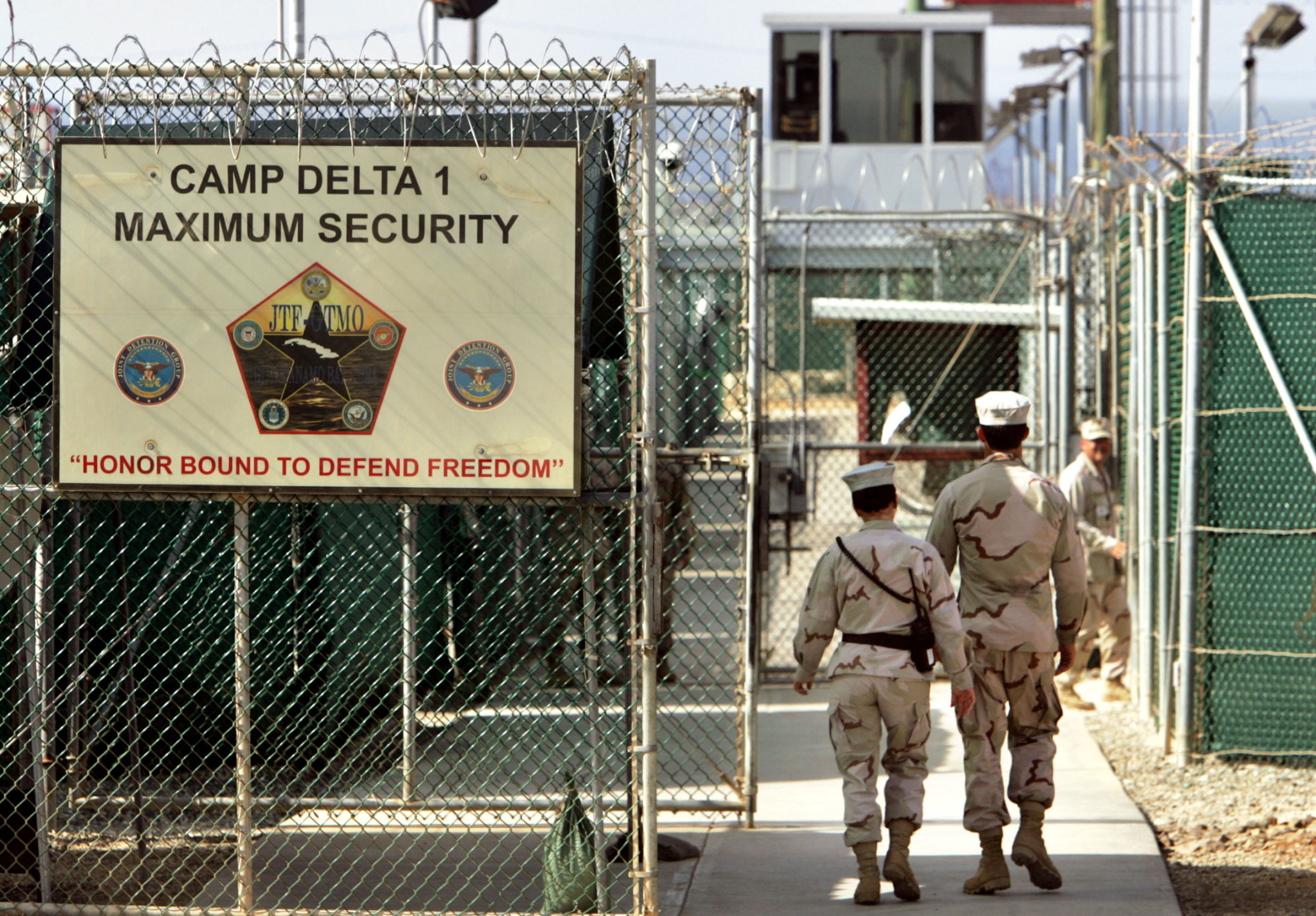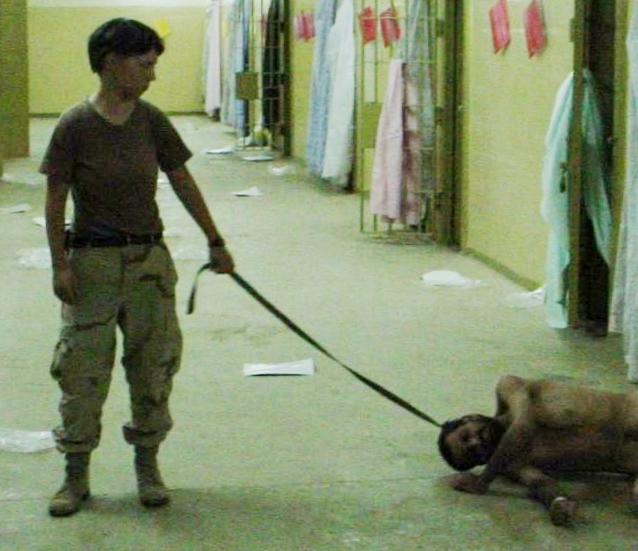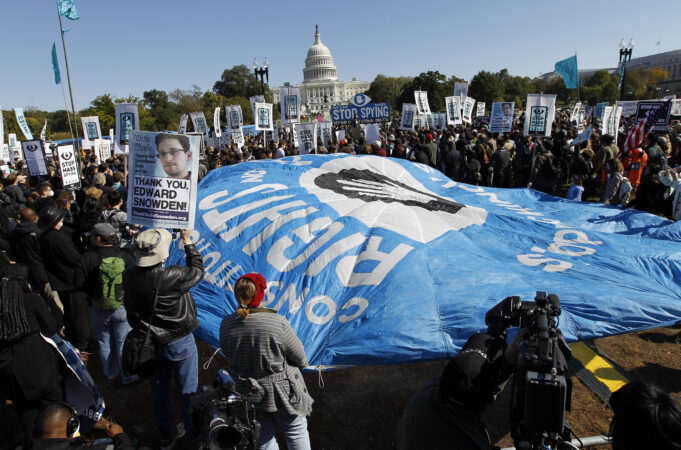As America remembers the loss of life on 9/11, many have forgotten that the country responded with mass surveillance, indefinite detention at Guantanamo Bay, religious discrimination, governmental policies of torture, and targeted drone killings.
“The greatest infringement on civil liberties is Americans’ right to privacy,” Dr. Wilmer Leon, author and syndicated columnist, told The Final Call. “America has developed into a surveillance state, whether it’s through closed circuit television, whether it is through the monitoring of telephone conversations, or spying on Americans by the intelligence apparatus in this country. It’s the Fourth Amendment that says people have the right to be protected from unreasonable searches and seizures,” he said.
“It is very, very serious. It is very detrimental. It is something that a lot of people don’t pay attention to. People have no idea that this continues to happen.”
Soon after 9/11 a scared Congress rushed through the Patriot Act.
It increases the government’s surveillance powers in four areas:
Records searches. It expands the government’s ability to look at records on an individual’s activity being held by a third parties. (Section 215)
Secret searches. It expands the government’s ability to search private property without notice to the owner. (Section 213)
Intelligence searches. It expands a narrow exception to the Fourth Amendment that had been created for the collection of foreign intelligence information (Section 218).
“Trap and trace” searches. It expands another Fourth Amendment exception for spying that collects “addressing” information about the origin and destination of communications, as opposed to the content (Section 214).
It gave unbeknown power to the government. “When you look at the history, the motivations behind creating the country in the first place, in terms of breaking from England and uniting the 13 colonies into a country, it was because, according to the Declaration of Independence, the overreach by the king,” said Dr. Leon.
“We have now been convinced through this trope of national security and terrorism that we have to relinquish our personal liberties in order for us to be safe. This phrase is attributed to Benjamin Franklin, ‘Those who will sacrifice liberty for security deserve neither.’”
Terry Albury is a perfect example of the Patriot Act gone very wrong. He was so disillusioned by what he was forced to do as an FBI agent in the so-called war on terror that he was willing to leak government documents to the press and go to jail when he was caught.
The reporter in his case was not named, however the dates in his plea agreement coincide with a series of articles published by The Intercept that detail how the FBI surveils both informants and suspected terrorists.
Day in and day out Mr. Albury confronted Muslims and terrorized them under the guise of surveillance. He would knock on their doors requesting to interview them and follow and harass them.
According to a sentencing memo filed by Mr. Albury’s attorneys, “This was an every-day encounter for Mr. Albury. He comported himself in this setting as a model FBI agent. But the conflict and depression generated by these routine but soul-destroying events took its toll.”
When it got to be too much for Mr. Albury he sent at least 25 documents, 16 of which were classified according to court documents, to the press.
“I did it because it got to a point where the reality of what I was a part of hit me in a way that just shattered my existence,” he said. “There is this mythology surrounding the war on terrorism, and the F.B.I., that has given agents the power to ruin the lives of completely innocent people based solely on what part of the world they came from, or what religion they practice, or the color of their skin. And I did that,” he adds. “I helped destroy people. For 17 years.”
“I apologize to everyone I have hurt as a result of my actions, especially my family, my co-workers in California and Minneapolis, and my colleagues in the law enforcement community,” Mr. Albury wrote in a letter to the court. He was sentenced to 48 months in prison in 2018.
“These documents confirmed what American communities—primarily Muslims and communities of color—and rights groups had long known or thought to be true,” explained Hina Shamsi, director of the National Security Project at the American Civil Liberties Union, to the media.
“For years we’ve been hearing from people who were surveilled or investigated, or watch listed with no apparent basis for the F.B.I. to suspect wrongdoing but based primarily on their race or religion or political organizing and beliefs. And here’s someone who was trying to do the right things from inside government and ended up either participating or being a witness or adjacent to a range of abuses that defined, and continue to define, the post-9/11 era. What are you supposed to do as a person of conscience when you see what your country is doing?”
Twenty years after the first detainees arrived at Guantanamo Bay Detention Center in Cuba, the United States is still holding 40 detainees, indefinitely, most without charge and none having received a fair trial.
“After 9/11 happened, I was kidnapped from Mauritania to Jordan, from there to Afghanistan and from there to Guantanamo Bay where I was tortured,” Mohamedou Ould Slahi told the virtual audience at the Rights or Rightlessness Event, January 11, to commemorate the 20thAnniversary of the first detainees arriving at Guantanamo Bay.

“I stayed there for 15 years and was released in 2016. I was never convicted or charged with any crimes,” he said. “Muslim dictators rounded up so many young men just because of suspicion. I understand suspicion but I don’t understand kidnap and torture. The U.S. twisted the arms of the leaders of so many countries, but we expected better from the U.S.”
Amnesty International released a new report January 11, that highlighted historic and continuing human rights violations at the Guantánamo Bay.
“This is about more than just the 40 people still held at Guantánamo—it is also about the crimes under international law committed over the past 19 years and the continuing lack of accountability for them. It is about the future, too, as we move towards the 20th anniversary of the 9/11 attacks and strive for enduring justice,” said Daphne Eviatar, director of the Security with Human Rights Program at Amnesty International USA.
The report documents a catalogue of human rights violations perpetrated against those detained at the camp, where victims of torture are held with inadequate medical care indefinitely and in the absence of fair trials. Transfers out of the facility have stalled, and even those cleared for release have remained incarcerated for years on end.
Religious persecution became a hallmark of the war on terror after 9/11. The war on terror became the war on Islam.
“There was a heightened surveillance. The government started sending agents into masjids to see what they were up to. For the immigrant communities, the South Asians, African Americans, Chinese Americans, Muslims come from so many places they were not surveilled in the same way. I think that they were just coming into view as Muslims,” Dr. Aminah Al Deen, chair of the Islamic Studies Department Emeritus at DePaul University, told The Final Call.
“When African American women, especially, started trying to look like Arab American women who are Muslim, they came under the same kind of surveillance and it was a cyber surveillance, just seeing who went to which masjid. Who was coming in and out of their houses, which houses they were coming in and out of,” she added.
“We definitely were not protected. You’re talking about a huge community of people from over 87 countries. Some were here undocumented; they were more at risk and many of them were deported. It was an interesting phenomenon, for Bangladeshis and some South Asians, they didn’t deport the wives and children, but they deported the men.”
El‑Hajj Mauri’ Saalakhan is president of the Aafia Foundation. He told The Final Call, “The list is long of cases of young and old but primarily young Muslims who were preemptively prosecuted by the fear of the American government.”
Mohammed Hossain, a respected member of his community, was targeted in a fictional FBI sting in 2004. He was convicted of material support for terrorism in 2006 and sentenced to 15 years. He was subjected to “preemptive prosecution,” which is a law enforcement strategy to target and prosecute individuals or organizations whose beliefs, ideology or religious affiliations raise security concerns for the government. Just in case the targets might become terrorists, the government concocts a sting. He was finally released in 2020 and returned to his community.
In another case the Liberty City 7, poor men from a Black neighborhood in Miami, were arrested by the FBI in June 2006 on charges of attempting to wage war on America. Then Attorney General Alberto Gonzales claimed they were plotting to blow up Chicago’s Sears Tower, to launch a “full ground war against the United States,” and to support al-Qaida.
The men, members of an unknown religious group called the Seas of David, had no actual connection to al-Qaida, no weapons, no explosives, no reconnaissance on the Sears Tower, no consistent ideology of violence.
The little if any evidence against them was based on a dialogue encouraged by a paid informant in a grand scheme of make believe. Their story became the making of a film directed by Dan Reed.
“These are all poor Black men,” said Mr. Reed in an article published in The Guardian. “Had they not been from that background, had they been well-off white kids, none of this would’ve happened probably, because the circumstances would’ve been totally different,” the outlet reported.
In 2004, Abu Ghraib was the worst example of U.S. secret military torture facilities around the world. The administration of then-president George W. Bush justified torture as necessary during the war on terror. Abu Ghraib housed several thousand prisoners, including women, teenagers, civilians, many of whom had been picked up in random military sweeps and at highway checkpoints.
They fell into three loosely defined categories: common criminals; security detainees suspected of “crimes against the coalition”; and a small number of suspected “high-value” leaders of the insurgency against the coalition forces.

It would have continued until pictures of the degrading, dehumanizing actions by the soldiers leaked out and numerous charges were filed against the leadership and it was shut down.
The Middle East Times summed up what Arab papers around the world said about the Abu Ghraib and Guantanamo situations; London based, Palestinian owned daily Al Quds Al Arabi on Abu Ghraib:
“President Saddam never presented himself as a leader of the free Western world and messenger of democracy for the Arabs and Third World, like President George W. Bush who invaded and occupied Iraq, killed 100,000 of its people under the pretext of spreading the culture of human rights and democratic freedoms.
“U.S. official justifications that these violations were carried out by a small number of soldiers was totally unacceptable because these troops represent the American government and because ‘it doesn’t need 150,000 troops to torture prisoners.’”
“Since 9/11, Muslims in America have been the victims of FBI watching Muslims, arresting Muslims, breaking into Muslim homes. Muslims have suffered in the airports; being stopped because of their names. Searched once, searched twice; and sometimes even if they spoke Arabic, something would come up that might even deny them a flight,” Nation of Islam Minister Louis Farrakhan noted in a 2010 interview with Al-Jazeera’s Abderrahim Foukara.
“Since 9/11, the way the government has acted toward Muslims, many Islamic scholars who would come to the United States to lecture, have found it difficult. And some, even now, do not wish to come because of what they have to go through to enter the United States. So the climate is getting increasingly more difficult,” the Minister stated.
Drone strikes used to target ISIS and other targets were used as late as August 27 in Kabul ahead of the U.S. withdrawal from Afghanistan after two decades. The strike killed 10 civilians, including seven children of a family looking forward to evacuating to America. Capt. Bill Urban, spokesman for U.S. Central Command, said that the U.S. was “aware of reports of civilian casualties.”
The government’s increasing erosion of civil liberties over the past 20 years can be seen in many ways. Luci Murphy is a D.C. community activist. “After 9/11people were so afraid about significant buildings being attacked that they closed the streets around the White House. We were used to being able to go to the White House to demonstrate,” she told The Final Call.
“Now there are barricades on Pennsylvania avenue, the White House side is closed to all vehicular traffic and sometimes to foot traffic. Lafayette park, which is close to the White House, across the street where a lot of people also demonstrate too is often fenced off and people are kicked out.”
It’s not just the barricades and lack of access to facilities that concerns Ms. Murphy.
“We had a celebration for Leonard Peltier, who is a Native American and has been falsely convicted of killing some FBI agents. Even though there’s evidence to show that he was not involved he’s been incarcerated almost 50 years now. Our celebration, a few days before 9/11, was to raise money for his defense,” she said.
“Since then, the proprietor of the cafe where we held the fundraising cannot get a permit to carry a legal firearm because he offered his space to raise funds for Leonard Peltier. He was visited by the FBI. The proprietor of Brooklyn’s Cup of Dreams is a very law-abiding citizen but because of the support he gave to one of our political prisoners cannot get a firearm.”
Retired U.S. Marshal Matthew Fogg sees a contradiction in the way America has handled the whole war on terror that has led to a massive erosion in civil liberties. “We promote terrorism on our soil and through our citizens, when we talk about racism. African Americans right up until today continue to face racism. We go to other countries and fight terrorist activity on their fronts while in America we have terrorists when we talk about hate crimes, race crimes and hatred that we’ve been dealing with for years,” he said.
“When it comes down to fairness, equality, we’re finding a lot of those things changing. What are your civil liberties? What are your rights? It’s always that question that comes down to somebody has to make a determination on it. That person does not look like you. That person in Congress or the Senate tends to be White. They don’t have to deal with the same issues. They don’t see it as a problem where we, people of color, live it and understand it.”













